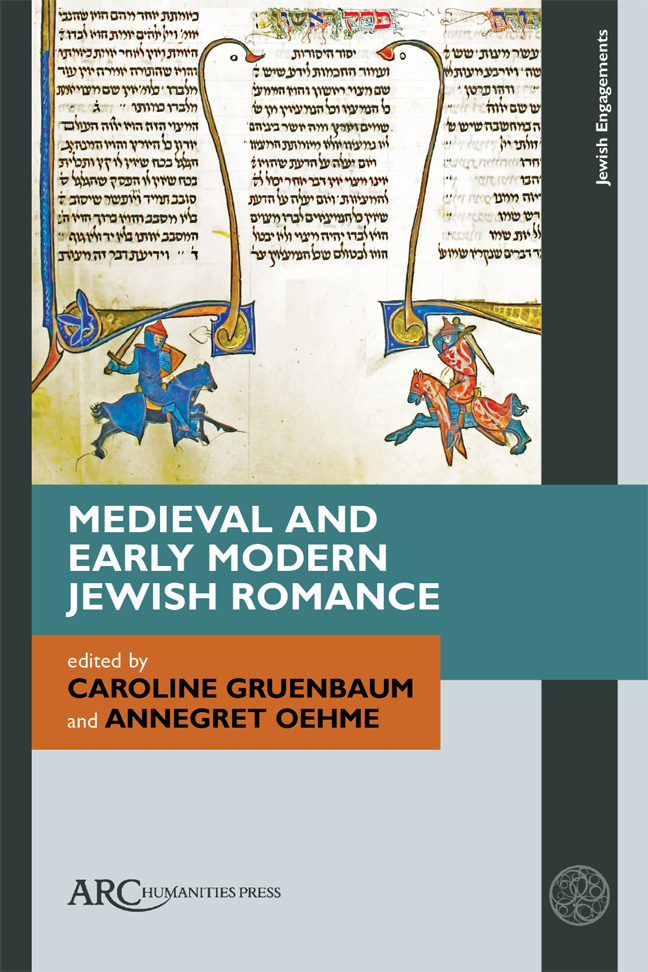Book contents
- Frontmatter
- Dedication
- Contents
- List of Illustrations
- Acknowledgements
- Introduction
- The Zohar as Medieval Jewish Romance
- Letters of Loathing: Immanuel of Rome and Romance Epistolary
- Illuminated Knights and Tales of Romance in the Rothschild Miscellany
- The Queen Nudatio: A Romanesque (?) Topos in Israel Caslari's Roman d’Esther
- At the Court of the Demon King: The Story of the Jerusalemite and Chivalric Romance
- Melekh Artus as a Jewish Romance: Horizons of Expectation and Genre Configurations
- A Friend in Need is a Friend Indeed?Friendship, Love, and Loyalty in the Yiddish Seven Sages of Rome
- Stealing Back One's Husband: The Yiddish Mayse mi-Danzek in the Context of Early Modern German Cross-Dressing Narratives
- Romance Elements in Meshal Haqadmoni by Isaac Ibn Sahula: A New Reading
- Afterword: Jewish Romance in Search of Identity
- Select Bibliography
- Index
Stealing Back One's Husband: The Yiddish Mayse mi-Danzek in the Context of Early Modern German Cross-Dressing Narratives
Published online by Cambridge University Press: 18 February 2024
- Frontmatter
- Dedication
- Contents
- List of Illustrations
- Acknowledgements
- Introduction
- The Zohar as Medieval Jewish Romance
- Letters of Loathing: Immanuel of Rome and Romance Epistolary
- Illuminated Knights and Tales of Romance in the Rothschild Miscellany
- The Queen Nudatio: A Romanesque (?) Topos in Israel Caslari's Roman d’Esther
- At the Court of the Demon King: The Story of the Jerusalemite and Chivalric Romance
- Melekh Artus as a Jewish Romance: Horizons of Expectation and Genre Configurations
- A Friend in Need is a Friend Indeed?Friendship, Love, and Loyalty in the Yiddish Seven Sages of Rome
- Stealing Back One's Husband: The Yiddish Mayse mi-Danzek in the Context of Early Modern German Cross-Dressing Narratives
- Romance Elements in Meshal Haqadmoni by Isaac Ibn Sahula: A New Reading
- Afterword: Jewish Romance in Search of Identity
- Select Bibliography
- Index
Summary
AMONG THE MOST interesting Yiddish manuscripts written in Northern Italy in the sixteenth century—i.e., at the threshold between the Middle Ages to the Early Modern period, when Jewish immigrants from Ashkenaz still spoke and wrote Yiddish before eventually turning to Italian as their everyday language—is MS Cambridge, Trinity College, F.12.45. It comprises two poems ascribed to the renowned humanist scholar, grammarian, translator, and poet Elia Levita, as well as three narrative texts primarily concerned with the topic of marriage: the Mayse mi-Danzek (Story from Gdańsk), the Mayse mi-Menz (Story from Mainz), and the Mayse fun Würms (Story from Worms). The Mayse mi-Danzek (fols. 10r–14r) seems to be the one most closely or at least most directly connected to a specific German literary tradition insofar as its author uses, combines, and modifies a narrative pattern developed by the authors of several late medieval German texts featuring a handful of common motifs at their core: adultery, cross-dressing, deception, female self-empowerment, and rescue from dire circumstances. Therefore, this tale is perfectly suited for a comparative approach that examines different attitudes towards the genre of medieval romance (meaning the corpus of texts consisting of and building on the tradition of high medieval courtly literature treating of chivalric deeds, courtly ideals, and relationships between knights and ladies, rulers and their liegemen, and different members of aristocratic families), and especially towards the conflicts arising from passionate love and/or marriage.
In the following discussion of this Old Yiddish text, which is followed by its first translation into modern English (pp. 167–70), I ask in what ways the Mayse mi-Danzek differs from German texts based on the same narrative pattern (“wife saves husband from dangerous situation by disguising herself as a man”) and whether it uses this pattern in a specific manner that can be explained in terms of its cultural and literary context. My purpose is to argue that both the Yiddish and the German manifestations of this shared narrative pattern focus on the characters’ struggle for agency in the face of certain social limitations. As previous scholarship has shown, German-speaking authors of cross-dressing stories are mostly interested in conflicts connected to the social category of gender. The author of the Mayse mi- Danzek, however, tells a tale that centres on the antagonism between people affiliated with different classes and religions.
- Type
- Chapter
- Information
- Medieval and Early Modern Jewish Romance , pp. 153 - 170Publisher: Amsterdam University PressPrint publication year: 2023



